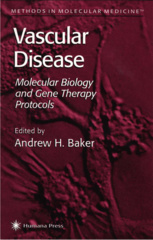Vascular Disease, Softcover reprint of hardcover 1st ed. 1999 Molecular Biology and Gene Transfer Protocols Methods in Molecular Medicine Series, Vol. 30
Langue : Anglais
Coordonnateur : Baker Andrew H.

Molecular biology has revolutionized research into vascular disease. Over the past 20 years molecular techniques have enabled us to both elucidate - lecular mechanisms in vascular disease and identify appropriate therapies. The vast explosion in technical knowledge and the array of protocols that become more advanced and intricate by the day lead us into new and exciting areas of research that were previously unobtainable. Vascular Disease: Molecular Biology and Gene Transfer Protocols - scribes today?s most powerful molecular methods for the investigation of the pathogenesis of vascular disease. The protocols are highly detailed, allowing beginners who have little experience in either vascular biology or molecular biology to embark on new molecular projects. This book is also suited to more experienced molecular biologists who wish to grasp new methods for stu- ing the involvement of genes in normal vascular physiology and in diseased states. It is well established that cardiovascular disease progression has a s- stantial genetic influence. Part I describes three methods that have been used successfully to identify specific mutations in candidate genes involved in c- diovascular disorders. These mutations include both single-stranded conf- mational polymorphism analysis and heteroduplex detection methods. In addition, technology to map new genes to specific regions of chromosomes by high-resolution mapping is described.
Genetics in Vascular Disease.- Detection of Mutations and DNA Polymorphisms in Genes Involved in Cardiovascular Diseases by Polymerase Chain Reaction-Single-Strand Conformation Polymorphism Analysis.- Analysis of Genetic Variants in Cardiovascular Risk Genes by Heteroduplex Analysis.- Radiation Hybrid (RH) Mapping of Human Smooth Muscle-Restricted Genes.- Isolation of Genes Expressed in Vasular Tissue.- Efficient Extraction of RNA from Vascular Tissue.- Preparation of cDNA Libraries from Vascular Cells.- Screening cDNA Libraries Using Partial Probes to Isolate Full-Length cDNAs from Vascular Cells.- Cloning Full-Length cDNAs from Vascular Tissues and Cells by Rapid Amplification of cDNA Ends (RACE) and RT-PCR.- Use of cDNA Representational Difference Analysis to Identify Disease-Specific Genes in Human Atherosclerotic Plaques.- The Use of Differential mRNA Display (DDRT-PCR) to Identify Genes Differentially Expressed in Normal and Diseased Vascular Cells.- Identification of Novel Protein Kinases in Vascular Cells.- Methods for Mapping Transcriptional Start Sites and Measurement of Promoter Activity in Vascular Cells.- Primer Extension Analysis to Map Transcription Start Sites of Vascular Genes.- Use of Liposome-Mediated DNA Transfection to Determine Promoter Activity in Smooth Muscle Cells.- Nuclear Run-On Assay to Study Gene Transcription in Vascular Cells.- Electromobility Shift Analysis (EMSA) Applied to the Study of NF-kappa B Binding Interactions in Vascular Smooth Muscle Cells.- Molecular Analysis of MRNA Expression in Vascular Cells.- Measurement of Gene Expression in the Vascular Wall by Reverse Transcription-Polymerase Chain Reaction (RT-PCR) Analysis.- Northern Blot Analysis to Quantify Gene Expression in Vascular Diseases.- Localization of Gene Expression inHuman Atherosclerotic Lesions by In SituHybridization.- RNase Protection Assays for Quantitation of Gene Expression in Vascular Tissue.- Molecular Methods to Study Apoptosis and Phenotypic Changes in Vascular Cells and Tissus.- Detection of Apoptosis in Atherosclerosis and Restenosis by Terminal dUTP Nick-End Labeling (TUNEL).- In Vitro Detection of Apoptosis in Isolated Vascular Cells.- Molecular Assessment of the Phenotypic Changes Associated with Smooth Muscle Cells Using Two-Dimension Electrophoresis and Microsequence Analysis.- In Vitro Methods to Express Foreign Genes in Vasular Cells.- Simple Methods for Preparing Recombinant Adenoviruses for High-Efficiency Transduction of Vascular Cells.- Generation of Recombinant Adeno-Associated Viruses for Delivery of Genes into Vascular Cells.- Hemagglutinating Virus of Japan Liposome-Mediated Gene Delivery to Vascular Cells.- High-Efficiency and Low-Toxicity Adenovirus-Assisted Endothelial Transfection.- Gene Transfer in Vascular Cells Using an Engineered Na-H Exchanger (NHE1) as a Selectable Marker.- Use of Retroviruses to Express Exogenous Genes in Vascular Smooth Muscle Cells.- Embryonal Stem (ES) Cell-Derived Macrophages.- Delivery of Recombinant Adenoviruses to Human Saphenous Vein.- In Vivo Vascular Gene Transfer Protocols.- An In Vivo Angiogenesis Assay to Study Positive and Negative Regulators of Neovascularization.- Efficient Liposome-Mediated Gene Transfer to Rabbit Carotid Arteries In Vivo.- Gene Delivery to Rabbit Arteries Using the Collar Model.- Delivery of Antisense Oligonucleotides to the Vascular Wall.- Local Gene Delivery of Recombinant Adenoviruses to the Rat Carotid Artery In Vivo.
Ouvrage de 441 p.
15.2x22.9 cm
Thème de Vascular Disease :
© 2024 LAVOISIER S.A.S.
